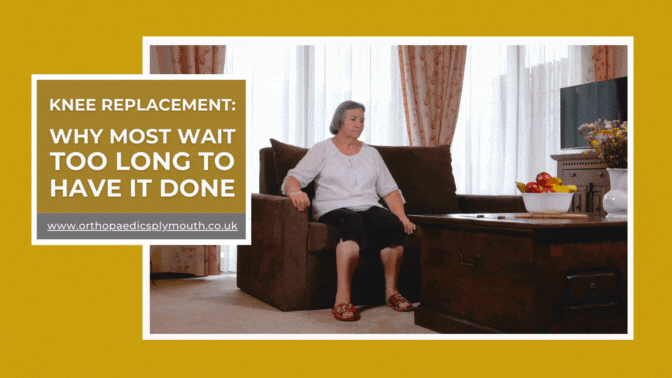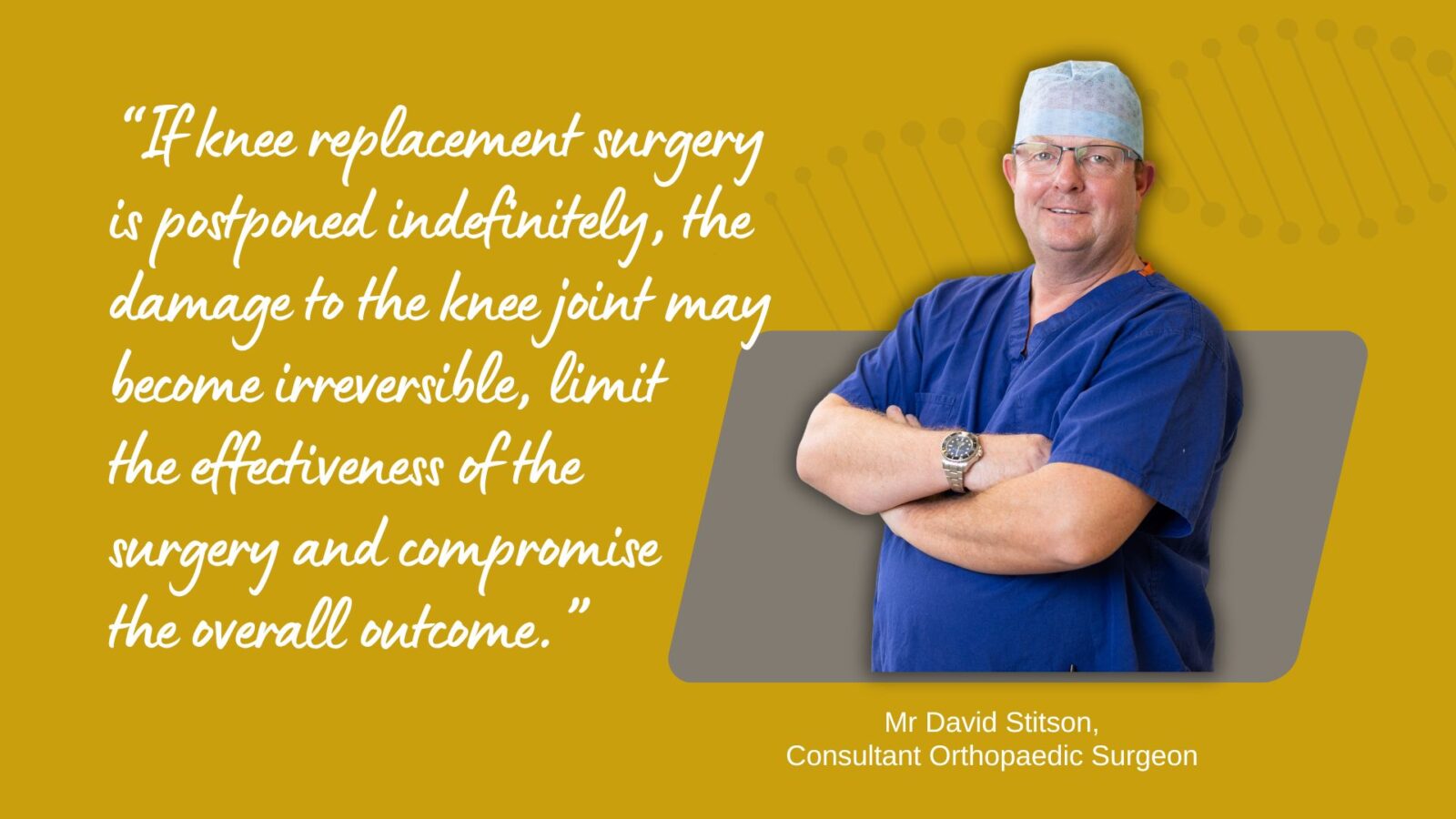Knee pain is a common complaint that many people experience as they age.
Whether it’s due to arthritis, injury, or wear and tear, the pain can become debilitating, affecting daily activities and quality of life. While knee replacement surgery can offer relief and improved mobility, many individuals delay seeking this option until their condition worsens significantly.
Contents
ToggleIn this blog, we’ll explore why most people wait too long to have knee replacement surgery, the risks of delaying it, what happens if you wait too long, how long a knee replacement lasts, and why going private for this procedure may be beneficial.
Why Most People Wait Too Long for a Knee Replacement
Several factors contribute to the delay in seeking knee replacement surgery. Fear of surgery, concerns about recovery, financial considerations and the hope that the pain will improve with non-surgical treatments are common reasons.
Additionally, some individuals may underestimate the impact of chronic knee pain on their overall well-being, choosing to tolerate discomfort rather than pursue surgical intervention.
What Happens If You Wait Too Long for Knee Replacement Surgery?
If knee replacement surgery is postponed indefinitely, the damage to the knee joint may become irreversible.
Severe arthritis can cause deformity and instability in the knee, making it difficult to walk or even stand. In some cases, bone-on-bone friction may occur, resulting in excruciating pain and further deterioration of joint function. Ultimately, delaying surgery may limit the effectiveness of knee replacement surgery and compromise the overall outcome.
Here are 6 consequences to consider if you wait too long for a knee replacement:
1. Increased Pain and Disability:
As the knee joint continues to degenerate, the pain and disability associated with osteoarthritis worsens. This can significantly affect quality of life and ability to perform daily activities.
2. Muscle Weakness and Imbalance:
Chronic knee pain can lead to muscle weakness and imbalance around the knee joint. This can further exacerbate the problem and make it more challenging to recover strength and function after surgery.
3. Joint Deformity:
In advanced cases of osteoarthritis, the knee joint may become deformed. This can result in further complications during surgery and may limit the effectiveness of the procedure.
4. Limited Treatment Options:
Waiting too long for a knee replacement may limit your treatment options. In some cases, the damage to the knee joint is so severe that conservative treatments such as physiotherapy, medication, and injections are no longer effective.
5. Increased Surgical Risks:
Delaying knee replacement surgery can increase the surgical risks, particularly if other health conditions develop or worsen over time. It is therefore advantageous to undergo surgery when you are in the best overall health.
6. Reduced Functional Outcomes: The longer you wait for knee replacement surgery, the more likely it is that you will not experience the full potential for functional improvement after the procedure. Intervention at the right time may lead to better results in terms of pain relief, mobility and overall function.
It is important to work closely with Mr Stitson to determine the most appropriate timing for knee replacement surgery based on your circumstances and the progression of your knee osteoarthritis.
Delaying knee replacement surgery can have significant consequences
If knee replacement surgery is postponed indefinitely, the resulting damage and deformity of the knee joint may become technically much more difficult to correct. Severe arthritis can cause deformity and instability in the knee, making it difficult to walk or even stand. In some cases, bone-on-bone contact may occur that results in severe pain disability.
As the condition progresses, pain and stiffness often worsen, limiting mobility and reducing the ability to perform everyday tasks.
Chronic knee pain can also lead to decreased physical activity, muscle weakness and weight gain, all of which may further exacerbate the problem. Prolonged use of pain medications to manage symptoms may also result in side effects and complications. Ultimately, with regard to outcome, timing of knee replacement surgery is especially important. Delaying surgery unfortunately may limit the effectiveness of knee replacement surgery and compromise the outcome.
How Long Does a Knee Replacement Last
The longevity of a knee replacement depends on several factors, including the patient’s age, activity level, weight, and the type of implant used. A well-performed knee replacement can be expected to last 20 years or more. However, younger, and more active individuals may require revision knee surgery earlier due to increased wear and tear on the prosthetic joint. Regular follow-up appointments with Mr Stitson in Plymouth are essential to monitor the implant’s condition and address any issues promptly.
Why Choose Private Knee Replacement Surgery
Opting for private knee replacement surgery offers several advantages over the public healthcare system. Private hospitals, such as the Nuffield Hospital in Plymouth, often have shorter waiting times for surgery, allowing patients to receive treatment sooner and avoid prolonged discomfort. Additionally, private facilities may offer a higher level of personalised care, with access to leading orthopaedic surgeons and state-of-the-art technology. Patients also have the flexibility to choose their surgeon and schedule the procedure at a time that suits them best. While private healthcare may involve out-of-pocket expenses (finance options are available), the benefits of timely treatment and superior quality of care are often well worth the investment.
A life-changing procedure
Knee replacement surgery can be a life-changing procedure for individuals suffering from chronic knee pain and disability. However, many people delay seeking this treatment due to various concerns and misconceptions.
Understanding the risks of delaying knee replacement surgery, the potential consequences of waiting too long and the benefits of private healthcare can empower individuals to make informed decisions about their orthopaedic care.
If you are experiencing persistent knee pain that interferes with your daily life, don’t hesitate to consult with Mr Stitson to explore your treatment options.
About Knee Surgery
Knee replacement surgery replaces the worn out, painful and stiff knee joint with a new prosthetic joint. This procedure which may be a partial or a total replacement is normally performed under spinal anaesthesia and is usually followed by a night or two in the hospital. Day-case knee replacement surgery may be an appropriate option for you.

About Mr Stitson
David Stitson is a Plymouth-based Consultant Trauma and Orthopaedic Surgeon. Trained both in the UK and internationally, he has worked in medicine for more than 20 years for the NHS, for the Royal Air Force and in private practice. Mr Stitson operates privately at the Nuffield Health Hospital, Plymouth.

The Nuffield Plymouth CQC Rating
The Nuffield Hospital has a history that spans over half a century and has built a reputation for high standards of care, professionalism and expertise in delivering health services. They aim for continuous quality improvement in everything they do.
Active Quality and Governance programmes are in place at the Nuffield Hospital Plymouth. As part of this, the hospital is inspected by independent healthcare regulators to ensure it meets the fundamental standards of quality and safety as determined by the regulating body (CQC).
In the most recent inspection, Plymouth Nuffield Hospital was rated as ‘Good’ overall, however, the surgical element of the inspection was rated as ‘Outstanding’. The hospital was referred to as:
“Outstanding in effective and caring, and
Good in safe, responsive and well-led.”





